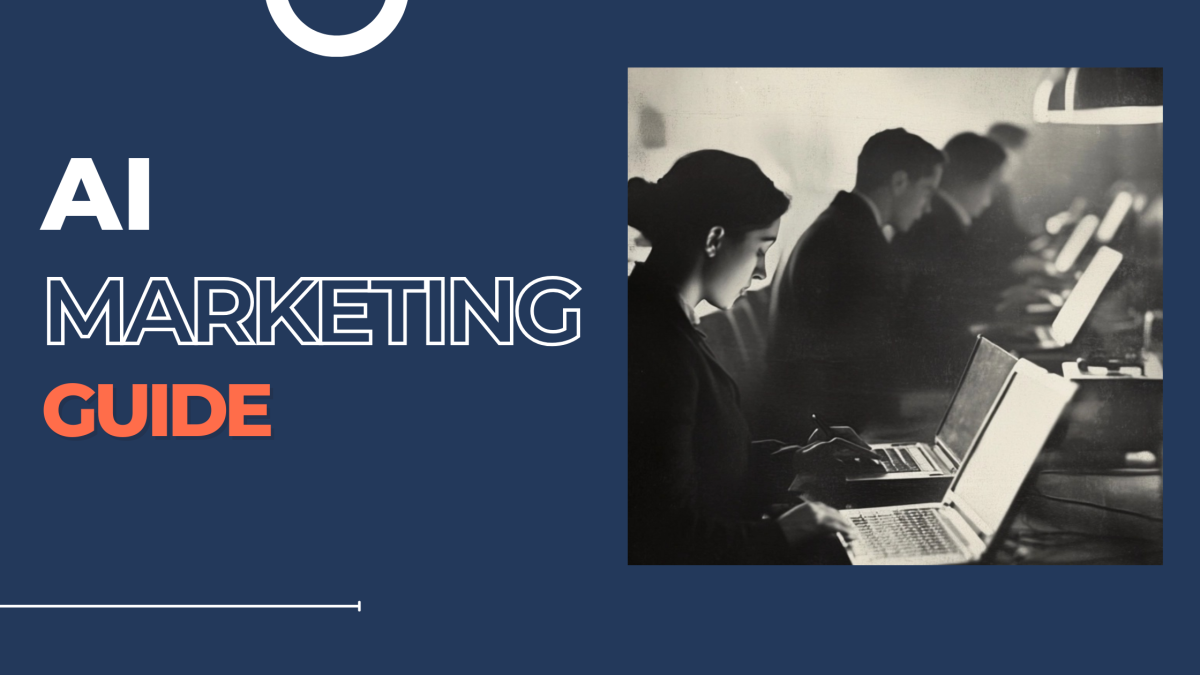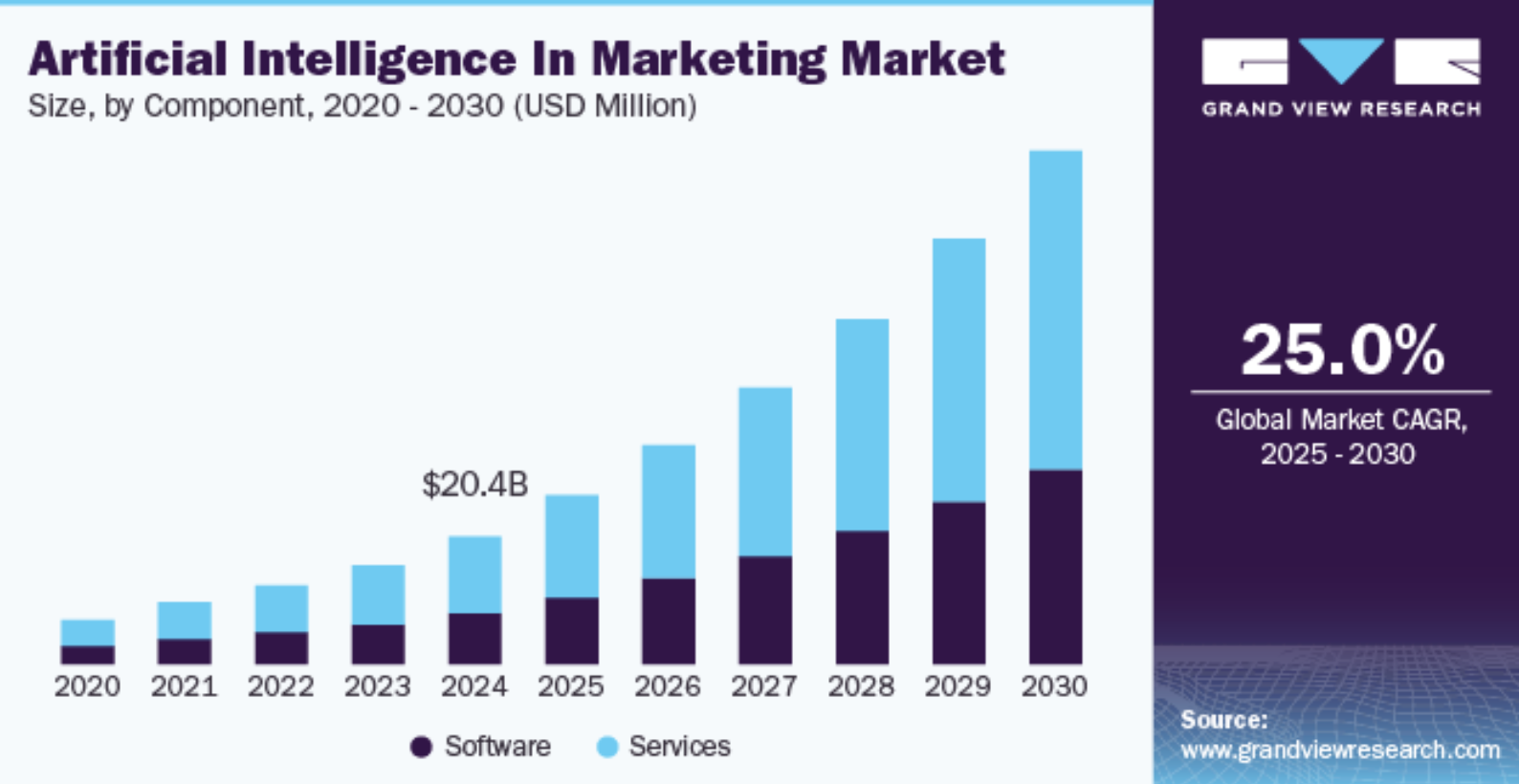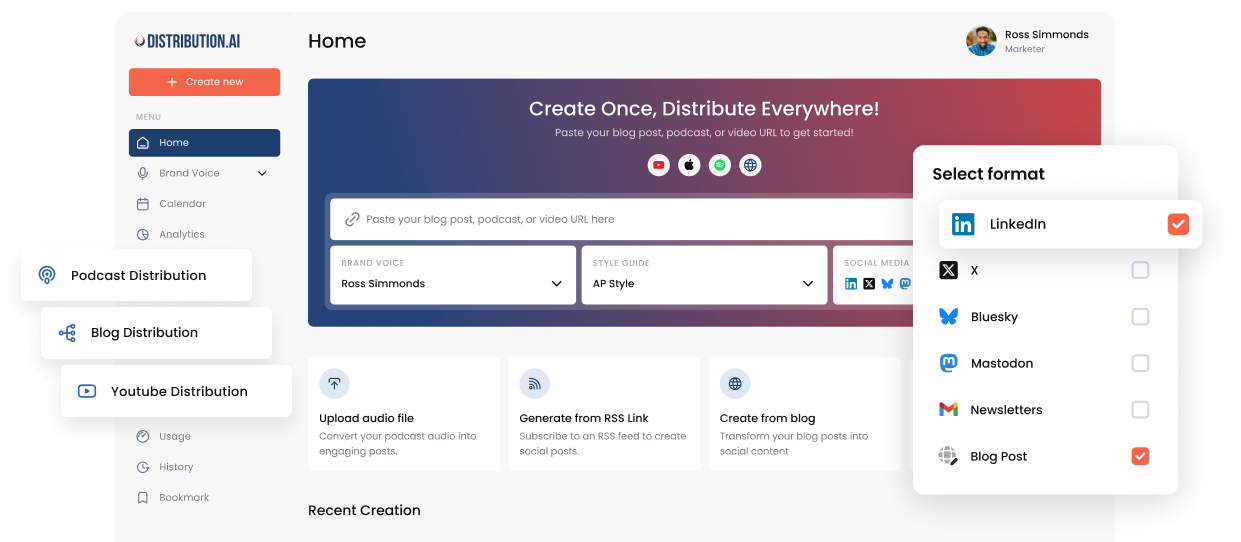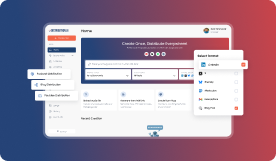The AI Revolution in Marketing: A Comprehensive Guide for 2026
AI is revolutionizing marketing, transforming everything from customer experiences to content creation. This guide explores how AI is reshaping the industry, providing valuable insights into its applications, benefits, and challenges, and offering actionable tips to help marketers stay ahead in this dynamic landscape.

As we step into 2026 and beyond, artificial intelligence (AI) has become an indispensable force in marketing, reshaping strategies, workflows, and customer experiences. This guide explores the transformative impact of AI on marketing, offering insights into its applications, benefits, and challenges for forward-thinking marketers.
The State of AI in Marketing in 2026
The adoption of AI in marketing has skyrocketed since the early 2020s.
By 2026, AI has become ubiquitous in marketing departments worldwide:
– Over 95% of marketers now use AI tools in their daily work
– AI-driven marketing spend has surged to $45 billion globally
– 90% of Fortune 500 companies have dedicated AI marketing teams
And according to Grandview Research; it’s showing no signs of slowing down. Here’s some stats showing the possible growth:

This widespread adoption has led to a seismic shift in how marketing is conceptualized and executed.
AI-Powered Marketing Transformation
In 2025, artificial intelligence continues to reshape the marketing landscape, enabling brands to drive innovation, enhance customer engagement, and optimize performance. Here’s a deep dive into the trends that will define marketing’s AI-powered future and actionable insights to stay ahead:
Hyper-Personalization at Scale
The age of generic marketing is over. AI empowers marketers to create tailored experiences that feel truly unique to every individual. AI can help with AI-powered content repurposing on social media too.
AI has revolutionized personalization, enabling marketers to deliver truly individualized experiences:
Dynamic Content Generation
AI algorithms dynamically generate personalized content in real-time, analyzing preferences, browsing behavior, and purchase history to adapt messaging. For example, AI in e-commerce enables platforms to showcase products that align with a user’s recent activity or seasonal preferences within milliseconds, creating a more relevant and engaging shopping experience.
Predictive Personalization
By leveraging predictive analytics, AI anticipates customer needs and proactively delivers relevant offers, product suggestions, or solutions. Think of it as the digital equivalent of anticipating a customer’s request before they voice it, driving higher engagement and conversion rates. Tools like Singulate represent the future of email marketing with personalization at scale built right into your email engine.
Emotional AI
Advanced sentiment analysis tools decode customer emotions through text, tone, and facial recognition, enabling brands to adjust messaging to resonate with emotional states. For instance, if a customer’s feedback indicates frustration, AI can suggest a more empathetic tone in communications or direct them to customer support.
The AI Impact
Brands leveraging AI-driven hyper-personalization report the following:
- 35% Increase in Customer Retention Rates: Hyper-personalized experiences foster stronger brand loyalty.
- 25% Boost in Revenue: Predictive personalization drives higher conversion rates and repeat purchases.
- 40% Reduction in Customer Acquisition Costs: AI streamlines targeting and eliminates wasted ad spend.
AI-Driven Audience Building and Targeting
AI has transformed how marketers identify and reach their ideal customers:
- Autonomous Segmentation: AI continuously analyzes vast datasets to create and refine audience segments in real-time.
- Predictive Targeting: Machine learning models predict which customers are most likely to convert, optimizing ad spend.
- Cross-Channel Orchestration: AI seamlessly coordinates messaging across multiple touchpoints for a cohesive customer journey.
Marketers using AI for audience targeting report a 50% reduction in customer acquisition costs and a 30% increase in conversion rates.In particular, businesses looking to enhance their local visibility can leverage AI search for local business strategies to ensure they’re found by relevant, nearby customers
Content Creation and Optimization
AI has become an indispensable tool for content marketers:
– AI-Generated Content: Advanced language models create high-quality, original content at scale[7]
– Multimodal Content Creation: AI tools generate text, images, videos, and even interactive AR experiences from a single input[44]
– Real-Time Content Optimization: AI continuously tests and refines content elements to maximize engagement[20]
Impact:
Marketing teams leveraging AI for content report a 70% increase in content production speed and a 40% improvement in engagement metrics.
Predictive Analytics and Decision-Making
AI has elevated marketing analytics to new heights:
– Prescriptive Analytics: AI not only predicts outcomes but recommends specific actions to achieve desired results.
– Autonomous Decision-Making: AI systems make real-time decisions on budget allocation, ad placements, and campaign optimizations.
– Trend Forecasting: Advanced AI models identify emerging trends months before they hit mainstream awareness.
Impact:
Organizations using AI-powered predictive analytics report a 35% increase in marketing ROI and a 25% reduction in wasted ad spend.
Conversational AI and Customer Experience
AI-powered conversational interfaces have transformed customer interactions:
- Hyper-Intelligent Agents: AI chatbots now handle complex queries, providing human-like support 24/7. Google Cloud included AI agents as a trend that is worth watching in 2025 and we strongly agree.
- Voice AI Integration: AI-powered voice assistants are seamlessly integrated into marketing strategies, enabling voice-based commerce and support
- Emotion-Aware Interactions: AI systems detect and respond to customer emotions in real-time, providing empathetic support.
Impact:
Businesses implementing advanced conversational AI report a 40% reduction in customer service costs and a 30% increase in customer satisfaction scores.
The Human Element in AI-Driven Marketing
While AI has automated many tasks, human creativity and strategic thinking remain crucial:
– AI-Human Collaboration: Marketers now work alongside AI, focusing on high-level strategy and creative direction
– Ethical AI Governance: Human oversight ensures AI systems align with brand values and ethical standards
– Emotional Intelligence: Human marketers bring empathy and cultural understanding that AI cannot replicate
Challenges and Considerations
As AI becomes more prevalent, marketers must navigate new challenges:
– Data Privacy and Ethics: Stricter regulations require transparent and ethical use of AI in marketing
– AI Bias Mitigation: Ongoing efforts are needed to identify and eliminate biases in AI algorithms
– Skill Evolution: Marketers must continuously upskill to work effectively with AI tools and interpret AI-generated insights
The Future of Marketing Careers
The rise of AI has reshaped marketing roles and skill requirements:
– AI Strategists: Specialists who develop AI-driven marketing strategies are in high demand[33]
– Data Scientists: Professionals who can extract actionable insights from complex datasets are crucial[37]
– Creative Technologists: Individuals who blend creativity with technical AI knowledge are highly valued[42]
Conclusion
As we navigate the AI-driven marketing landscape of 2026, it’s clear that artificial intelligence has become an indispensable tool for marketers. Those who embrace AI’s potential while maintaining a focus on human creativity and strategic thinking will thrive in this new era. The future of marketing is a symbiosis of human ingenuity and AI capabilities, promising unprecedented levels of personalization, efficiency, and impact.
Sources for insights:
Frequently Asked Questions
Promote, repurpose & distribute your content with AI
Start 15-Day Free Trial
